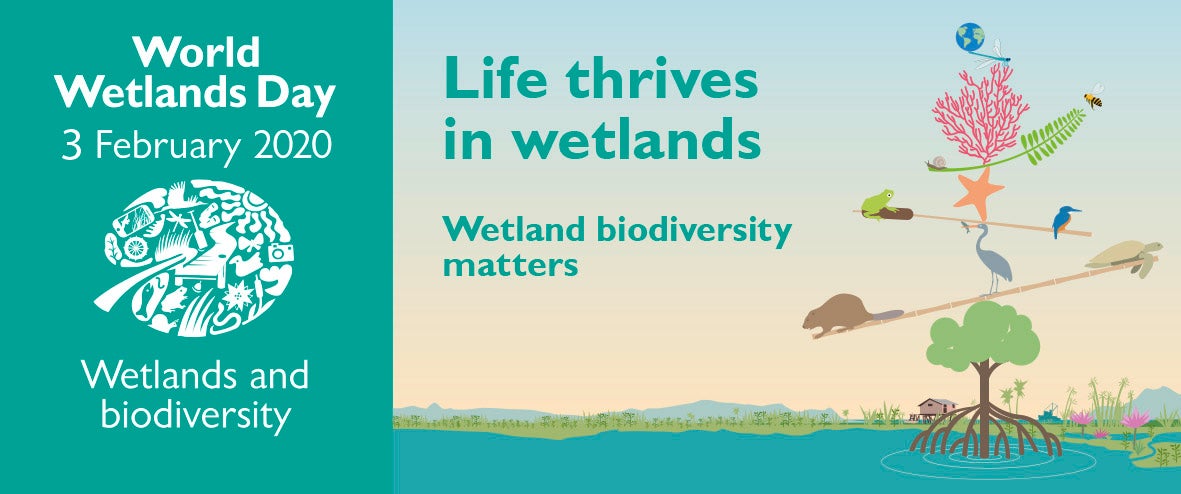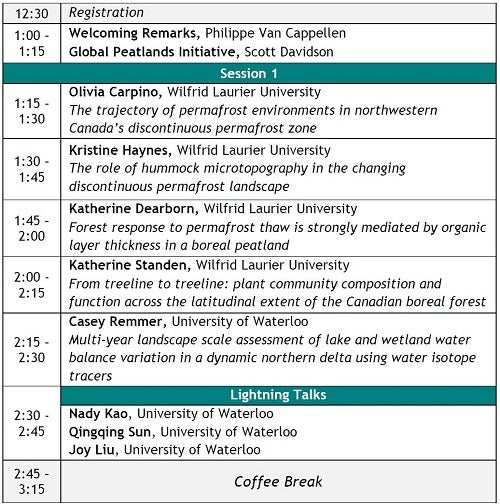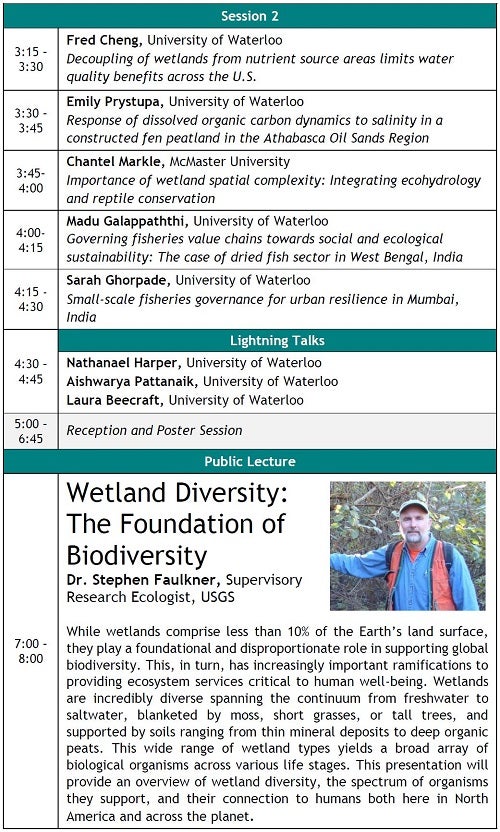8th Annual World Wetlands Day Research Symposium at the University of Waterloo

Our 8th annual World Wetlands Day event was held on Monday, February 3, 2020 at Federation Hall. The event featured an afternoon symposium showcasing some truly diverse and impressive wetlands research, including seminars, lightning talks and poster presentations. Prizes were awarded for the Best Graduate Student Poster, to Miranda Hunter, and for Best Undergraduate Student Poster, to Kelly Tran and Nidhu Jagoda - congratulations! In the evening, there was a public lecture delivered by Dr. Stephen Faulkner, Supervisory Research Ecologist at USGS titled "Wetland Diversity: The Foundation of Biodiversity". Special thanks to the sponsors of this event: Aquanty, Solinst Canada Ltd., City of Kitchener and Canadian Water Resources Association. Additionally, we would like to thank the Water Institute and Global Water Futures for supporting this event.
Program


Poster Presentations
1. Kathy Szigeti:Rescuing USSR historical surface weather observations to support cold region research
2. Heather Townsend: Examining the influence of frost on carbon and nitrogen cycling in cold region organic soils under current and future climates
3. Nady Kao: Phosphorus retention and speciation changes in a Southern Ontario dammed reservoir
4. Joy Liu: Checkered landscapes: Spatial targeting of watershed management practices to minimize time lags
5. Nathanael Harper: Can we use detection of environmental DNA to determine amphibian species composition in vernal pools across a temporal scale?
6. Emily Prystupa: Response of dissolved organic carbon dynamics to salinity in a constructed fen peatland in the Athabasca Oil Sands Region
7. Linden Fairbairn: Linking soil moisture and carbon dioxide fluxes: Exploration of metabolic processes and driving factors
8. Ryan Kangro: Investigating methane emissions from a calcareous fen
9. Aishwarya Pattanaik: Vulnerability of small-scale fishing communities and mangrove ecosystems in Sundarbans, India
10. Tamara Van Staden: Spatio-temporal vulnerability to phosphorus losses in agricultural watersheds
11. Kobi Logendrarajah: Supplements for diplomacy: Revisiting the South China Sea Marine Park
12. Alison Mao: Soil oxygen and moisture dynamics during winter and shoulder seasons
13. Fereidoun Rezanezhad: Winter carbon losses in wetland ecosystems under current and future climates
14. Bhaleka Persaud: The Cuizinart: Slice and dice your environmental datasets
15. Navya Nair: Analysing water quality issues to examine vulnerability of small-scale fisheries in Chilika Lagoon, India
16. Rosina Amoah Agyapong: Building local resilience to climate change vulnerability in small-scale Fisheries in Lake Victoria, Tanzania
17. Joyce Sekyi: Adaptation responses of small-scale fishing communities to the effect of crude oil extraction in Ghana
18. Qingqing Sun: Temporal and spatial variation of wetlands in China (Case study of Beidagang Wetland, Tianjin, China)
19. Valeria Mendoza: Eco-tourism planning and cross-sector partnerships in Chilika Lake, India
20. Nataša Popović: Evaluating decomposition rates of dominant vascular vegetation in a constructed peatland
21. Zahra Akbarzadeh: Phosphorus cycling in nearshore areas of Lake Erie
22. Owen Sutton: Modelling the effects of vegetation growth on the ecohydrologic trajectory of a reclaimed upland
23. Gabriel Dubé: Unsaturated flow fingering in a constructed upland
24. Kelly Tran + Nidhu Jagoda: Temperature and moisture controls on CO2 flux dynamics in northern peatlands
25. Mehdi Gharasoo: Soil heterotrophic respiration as a function of water content in a mechanistic pore-scale model
26. Sarah Fettah: Quantifying water use and water availability of dominant tree species in a post-mined landscape in the Athabasca Oil Sands Region, Alberta
27. Rebecca Cameron: Atmospheric nitrogen deposition loads on a constructed fen-upland and reference fens in the Athabasca Oil Sands Region, Alberta
28. Brandon Van Huizen: What controls the spatial variability in seasonal ground ice, and do the spatial patterns lead to distinct spatial patterns in potential evapotranspiration?
29. Mahyar Shafii: Phosphorus cycling within stormwater management infrastructure: Insights from data analysis and (future) reactive transport modeling of stormwater ponds and wetlands
30. Tasha-Leigh Gauthier: Challenging the assumption of low intra-species variability in sphagnum hydrophysical properties
31. Megan Schmidt: Impact of seismic line restoration on carbon dioxide fluxes
32. Ryan Cheung: Changes in temperature and precipitation extremes in Southern Ontario
33. Claire Estey: Nitrous oxide flux dynamics in a calcareous fen
34. Nicole Balliston: Patterned peatlands in the James Bay Lowland and the potential feedbacks of anthropogenic stressors
35. Sisir Kanta Pradhan: Re-imagining value in dried fish value chain through a social-ecological systems perspective
36. Kimberly Kleinke: Vegetation responses to altered nutrient pools on seismic lines
37. Miranda Hunter: Vacuum extracted peatlands: Environmental drivers of carbon dioxide and methane emissions
38. John Dony: A random forest in the Great Lakes: Exploring nutrient water quality signatures in the Laurentian Great Lakes Watersheds
39. Jovana Radosavljevic: Influence of urban landscape on Lake Wilcox’ water quality
40. Angelos Alamanos: What do we know about the cost-effectiveness of wetlands as a nature-based solution to buffer phosphorous in Canadian landscapes?
41. Taylor Vodopija: Nutrient dynamics within a restored seismic line peatland
42. Laura Beecraft: Is periphyton filtering our wetlands?
43. Janet Hu: Hydrology of a disturbed channel fen watershed
44. Saru Saraswati: Isothermal calorimetry to study the soil organic matter decomposition in various wetlands ecosystems
We thank Philippe Van Cappellen, Maria Strack, Fereidoun Rezanezhad, Scott Davidson, Harriet Bigas, Bhaleka Persaud, Linden Fairbairn, Nataša Popović, Kirsten Grant, Julie Grant, and Heather Neufeld for their help in organizing this event.
About World Wetlands Day
February 2nd is World Wetlands Day, which marks the day when the Convention on Wetlands was adopted in 1971 in Ramsar, Iran. The Convention is an international government agreement acknowledging the importance of wetlands and plays a central role in the wise use and conservation of these critical ecosystems. To learn more about the Convention, visit: https://www.ramsar.org/.